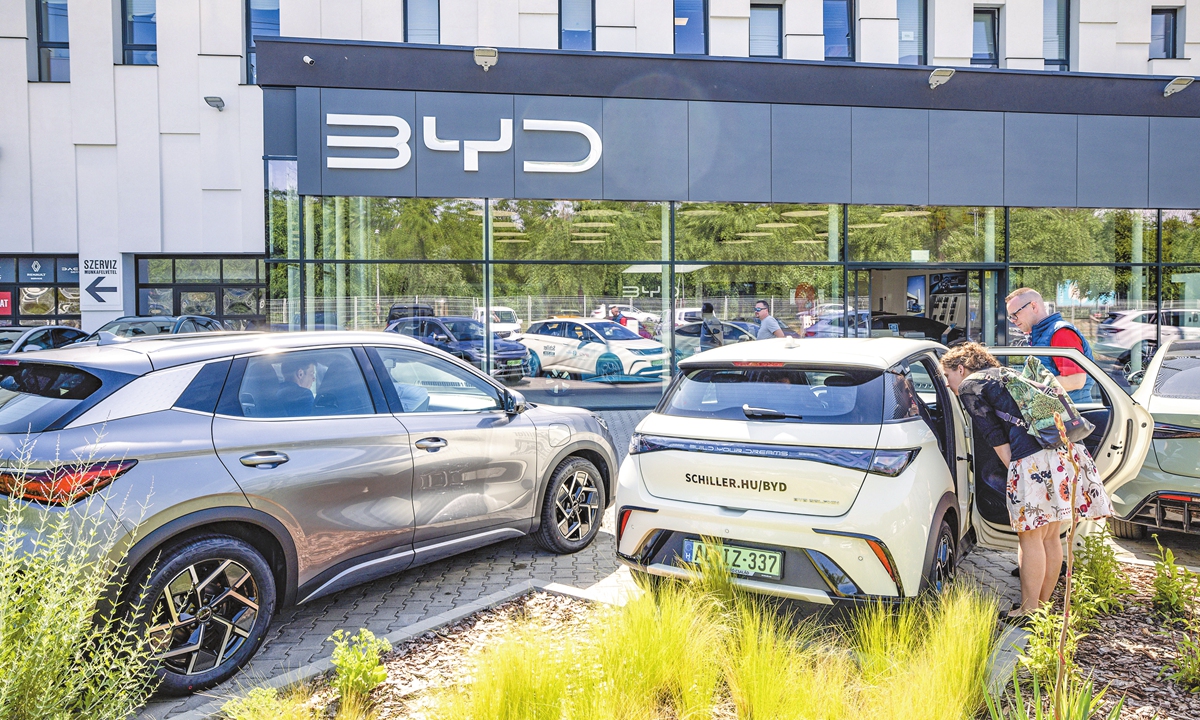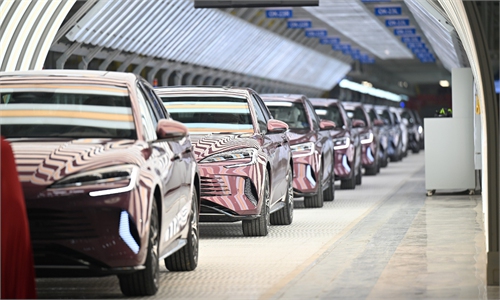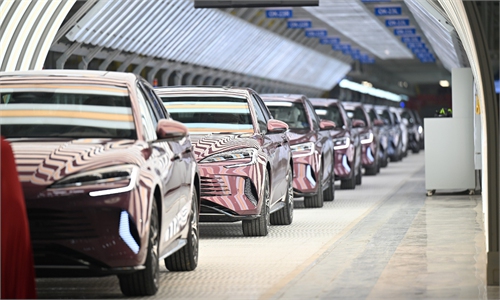EU’s EV subsidies typical double standards
Bloc’s protectionist tactics aim at enhancing global edge for emerging industries

Customers check BYD's EV at a store in Budapest, Hungary, on May 27, 2024. Photo: VCG
On August 20, the European Commission (EC) unveiled a draft decision to impose final countervailing duties of between 17-36.3 percent on battery electric vehicles (EVs) imported from China. Since the case was first launched in September 2023, it has attracted close attention from the international community.
Many EU member states, automotive industry organizations and companies, think tanks, and scholars have pointed out that this so-called anti-subsidy investigation serves as protectionism in the name of "fair trade" and that the development of the EU EVs industry should not be protected from competition.
The investigation reflects the EU's attempt to seize the upper hand in the new round of global industrial competition amid a green transition. In recent years, many countries have listed the "new three" industries - photovoltaic products, EVs and lithium-ion batteries - as priorities for development, including the EU.
While strongly criticizing the implementation of subsidies under the US Inflation Reduction Act, the EU is providing various subsidies for its local "new three" industries. In fact, the bloc's purpose of accelerating the development of new-energy industries, such as the "new three," is not only to achieve the UN goal of sustainable development, but also to enhance the global competitiveness of the EU industry and seek a world-leading position. In this process, the EU has implemented a significant number of industrial subsidy policies.
EU's subsidy support
In recent years, the EU has been increasing financial support to the green industries including the "new three" with enhancing the global industrial competitiveness as one of its important objectives. There are two main ways for the EU to provide subsidies:
First, the EU uses the funds from the budget of itself to provide subsidies to the new-energy industry through establishing various funds and programs.
Second, the EU member states use their public funds to provide state aids to the new-energy industry.
In 2019, the EC issued the European Green Deal, proposing specific emission reduction goals and emphasizing the key role of green energy transition. It focuses on the development of the "new three" industries and other new-energy industries, and requires the member states to promote the EU's energy standards and technologies at the global level to ensure the global leadership and competitiveness of the EU's new-energy industries.
The EC published a new Industrial Strategy for Europe in March 2020 - updated in May 2021, which identifies three strategic and policy objectives, with a particular emphasis on the creation of globally competitive and world-leading industries in the bloc.
The EC requires member states to rationalize the use of public funds to provide investment and financing support for green transition and proposes amendments to EU state aid provisions in order to support development in priority sectors, including through better use of funds from the Important Project of Common European Interest (IPCEI) to promote investment in relevant sectors.
From 2018 to August 2024, under the IPCEI, the EC approved a total of 36.2 billion euros ($40.41 billion) in state aid for batteries, hydrogen, microelectronics and communication technologies, as well as next generation cloud infrastructure, according to data released by the EC.
This move clearly demonstrates that the EU is going all out to implement the "new three" industry support policy in order to boost its global competitiveness and secure leadership in emerging industries.

Shi Xiaoli Photo: Courtesy of CUPL
Double standards
In response to the EU's "anti-subsidy" investigation against Chinese EVs, China raised objections to the justification of purpose of the EC's investigation, holding that such measure was out of political considerations and was protectionist. Over recent years, the EU itself has provided billions of euros in subsidies to build its own EV supply chain, and will continue to subsidize the local EV industry in all aspects in the future.
After the EC announced the draft decision on its "anti-subsidy" investigation against Chinese EV on August 20, a Chinese Ministry of Commerce (MOFCOM) spokesperson pointed out that the EU's "anti-subsidy" investigation on Chinese EV products had preconceptions, and every step of the investigation violated the EU's commitment to the principles of "objectivity, fairness, non-discrimination, and transparency," which was also inconsistent with the WTO rules. These practices are actually "unfair competition" under the name of "fair competition."
The EU's draft decision did not fully consider China's opinions, yet it persisted in the flawed practice of imposing high duty rates and using a biased sampling process that discriminates against different types of Chinese companies, distorting the investigation's results. The draft decision was based on the so-called facts unilaterally identified by the EU, instead of facts recognized by both sides, the MOFCOM spokesperson said.
On August 9, China submitted a request for consultations with the EU at the WTO Dispute Settlement Body. China considers that the determination by the EC to initiate the investigation is inconsistent with related articles under certain agreements, and the EU acted inconsistently with the WTO Agreements in both procedural and substantive aspects, which have injured China's interest entitled under the related agreements.
While vigorously developing and subsidizing its own "new three" industries, the EU takes discriminatory restrictive measures against such products originated from other countries. The EU is employing a typical double standards and protectionist approach and its true intention is thought-provoking and concerning.
The authors are scholars at China University of Political Science and Law (CUPL). bizopinion@globaltimes.com.cn


